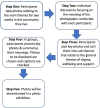Exploring the well-being of people affected by skin NTDs in Kaduna and Kwara States, Nigeria: a photovoice and scoping review study
- PMID: 36960812
- PMCID: PMC10037263
- DOI: 10.1093/inthealth/ihad003
Exploring the well-being of people affected by skin NTDs in Kaduna and Kwara States, Nigeria: a photovoice and scoping review study
Abstract
People affected by skin neglected tropical diseases (NTDs) grapple with both physical and emotional reactions that compromise their health and well-being. Multiple studies with people affected by skin NTDs have shown high levels of poor mental well-being using self-report questionnaires or psychological measures. However, few have provided in-depth documentation of lived experiences from the perspective of affected persons and there is limited consideration of how their viewpoints can be used to shape intervention design. This article draws together findings from an international scoping review and a photovoice study conducted in Kaduna and Kwara States, Nigeria. Our combined analysis, which situates the lived realities of people affected by skin NTDs within the existing evidence base, was used to inform the design of a subsequent well-being intervention. Using Meyer's (2003) minority stress model, we have illustrated that there is a synergistic relationship between mental health, chronic morbidity and disability from skin NTDs. This relationship results from a complex interplay of factors including pain and discomfort and a reduced ability to function and participate in areas such as livelihoods, food provision and education. Stigma and discrimination act as a catalyst for these functional limitations and participation restrictions, resulting in feelings of being useless, broken, shame and sadness. The critical role of participatory methods in our study emphasises how people affected by skin NTDs have multiple coping mechanisms that can be galvanised in the provision of holistic NTD care. We recommend that NTD programmes should strengthen relationships with affected persons to identify pre-existing support platforms that can be used to support the emotional and physical health and well-being of affected persons. Working with affected persons and community actors to strengthen necessary intersectoral approaches is a first step in designing and delivering such holistic care.
Keywords: emotional reactions; health; persons affected; psychosocial; skin neglected tropical diseases; well-being.
© The Author(s) 2023. Published by Oxford University Press on behalf of Royal Society of Tropical Medicine and Hygiene.
Conflict of interest statement
All authors declare that there are no competing interests.
Figures
References
Publication types
MeSH terms
LinkOut - more resources
Full Text Sources





